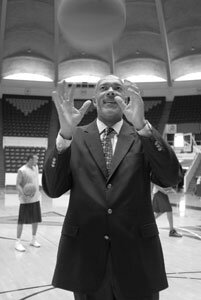THE SPORTS DOCTOR- Finger pointing: The problem's Craig, not Al

It takes a big man to admit when he's wrong. When Craig Littlepage 'fess up?
FILE PHOTO BY JEN FARIELLO
In 2007, when I learned that Mr. Know-it-All himself, Stephen Hawking, had spent 30 years making an idiot of himself with a bogus black hole theory, I was thrilled. It was validating to know that even the most venerated (and egotistical) of us could be totally wrong. I prayed that if I were ever that wrong, it wouldn't take me 30 years to admit it– and it hasn't. I'll say it loud and say it proud: I was wrong.
For three years, my attempts to identify the source of UVA's football trouble had led me to one culprit. All the evidence pointed in his direction: the incessant running offense, the penchant for criminals, and the unqualified waste of NFL-caliber players. I held one man responsible for the Cavs' problems, and that man was Al Groh.
I was right about the one man, but I was mistaken in his identity. Al Groh is not the culprit.
Craig Littlepage is.
Heeding the old detective adage, I followed the money. I looked to UVA's Board of Visitors, the organization that approves the University's policies and budget. A $1.8 million coach's salary and recent approval of an $8 million bubbled practice field– a facility that will serve about 650 of the University's 21,057 students, and that will require a new million-dollar bubble every ten years– are more indicative of responsibility than culpability.
When it comes to athletics, the Board of Visitors has two primary responsibilities: to make sure there are no Title IX violations, and to ensure costs don't exceed profits. That's not to say the Board would unquestioningly approve an intercollegiate cornhole field– but they wouldn't have to. The Board doesn't separate athletic wheat from the chaff; they trust an athletic director for that.
One would be hard-pressed to find anyone in athletic administration more lauded than Craig Littlepage. He's the first African-American athletics director in ACC history, former chair of the NCAA Men's Division I Basketball Committee, current chair of the ACC Women's Basketball Committee, and on and on. But as formidable as Littlepage's résumé is, there's one main thing that attests to a power that's almost unheard of at the Division I level: a perennially bad football coach.
At most D-I schools, the football coach is Simon to the athletic director's Garfunkel. Coaches are better paid, better known, better-connected, and eminently more influential than their supposed "directors." If Pete Carroll wants a tight end with a 1.5 grade-point average, I don't doubt USC's athletic director would risk his job to stop it from happening. Even Notre Dame's AD would hesitate to confront Charlie Weis. Why fight a losing battle?
In 2006, when Groh knowingly recruited academically ineligible students, Littlepage refused to back him, hinting that he noticed Groh's dissimilarity to Pete Carroll. In 2008, Littlepage flexed his muscles again, rescinding a six-week ban on signs, despite their continued attacks on Groh. I doubt Weis would have allowed it.
If Craig Littlepage has the power to simultaneously bilk the athletics budget and publicly chasten his head football coach, what gives? Why does Littlepage, a former member of the NCAA Committee on Infractions, defend a football program that has seen six arrests in one year? How can Littlepage, a former chair of the ACC Student-Athlete Welfare Committee, not defer to the Honor Committee?
How can Littlepage, who was twice named the Black Coaches Association's "Athletics Administrator of the Year," retain Al Groh after yet another humiliating season?
I don't know the whys and hows of Craig Littlepage. What I do know– what has become painfully clear– is that the fate of UVA athletics doesn't lie with a Board or a coach. For good or bad, Al Groh is what he is. Craig Littlepage is the rudder that steers UVA football.
It took 30 years for Stephen Hawking to admit he was wrong. Craig Littlepage has been UVA's athletic director since 2001. Only 22 more years to go.
#